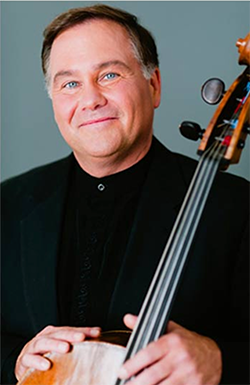by Mike Telin

On Monday, November 6 at 7:30 pm at West Shore Unitarian Universalist Church, Robinson will be joined by pianist Hyunsoon Whang and clarinetist Daniel McKelway in a concert that includes Samuel Barber’s Cello Sonata in c, Sergei Prokofiev’s Cello Sonata in C, and Johannes Brahms’ Intermezzo in A, Op. 118, No. 2 as well as his Clarinet Trio. The free concert is part of the Rocky River Chamber Music Society series. Click here for the livestream.
Robinson, who is a founding member of the Miami String Quartet, noted that Monday’s concert will be his debut performance of the Prokofiev Sonata. “Hyunsoon and I have played the Barber and Rachmaninoff sonatas together and we were thinking about doing the same. Then we said, ‘Wait, let’s learn a new piece’ — it just makes it interesting for us.”
The cellist said that he has found the Prokofiev to be “really enchanting,” and that it complements Barber quite well. “They’re pretty close in age — Barber wrote his in 1932 and Prokofiev was in the late ‘40s. The Barber is dark and brooding, and the Prokofiev can be pretty funny at times. You can tell the Barber is heavily influenced by Brahms, and because it’s in the key of c-minor, it is dark.”
While Robinson was a student at the Curtis Institute of Music, he had the opportunity to study with the man who premiered the Barber: Orlando Cole. “My teacher was David Soyer, but when he was away, we’d get lessons from Orlando Cole. He and Barber were very good friends, and while I didn’t study it with him, when I came to it later in life I just fell in love with the piece. It’s got some beautiful melodies and is so well-written — I have to say, it’s one of the better-written sonatas for the cello. And because of the key, you’ve got that low C string to resonate.”
Robinson noted that Prokofiev’s sonata is also written in a key favorable to the cello. “The key of C major lends itself to a lot of good vibrations in the instrument. There are a lot of highlights — hats off to the second movement with its jocularity and the humor. And the last movement finishes so big — again, with that low C string you belt it out, so it’s a heroic work.”
It took quite a bit of time for Prokofiev to receive the nod of approval from the Soviet Ministry of Culture to have the sonata performed. “I think that only happened because it was being premiered by Mstislav Rostropovich and Sviatoslav Richter — two pretty good people to give the premiere of your sonata. So it helps to have friends, right?”
The program will conclude with Brahms’ Clarinet Trio, which Robinson said is a near-perfect piece. “I have to take my hat off to it every time, give it the respect it deserves, because it’s a tough cello part. I think clarinet trios are a good combination of voices between the clarinet sound, the cello sound, and of course the beautiful piano sound — it’s a winning combination.”
Although Robinson first played the piece in college and has played it many times since, he said that it’s taken him decades to feel comfortable with it. “I do love the piece and I’ve had the opportunity to play with a lot of great players — and Dan is one of them. I look forward to doing it with him, that’s for sure.”
Putting Robinson on the spot, I asked him if he agreed with the old adage that the cello is the instrument that sounds most like the human voice. “Absolutely. There’s no doubt about that. I have to say that I was humbled when I worked with a vocalist from the Met. She had the most beautiful voice and the most natural phrasing, and I looked at my cello and said, this is just a toy compared to what her voice is. But that’s certainly what cellists should aspire to, is to sound like a great voice, whether it’s soprano, alto, tenor, or bass. And that’s what we all should aspire to.”
Published on ClevelandClassical.com November 2, 2023.
Click here for a printable copy of this article



